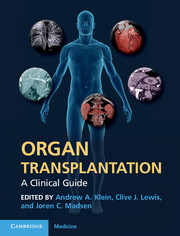Book contents
- Organ Transplantation
- Organ Transplantation
- Copyright page
- Contents
- Contributors
- Foreword
- Preface
- Abbreviations
- Section 1 General
- Section 2 Heart
- Section 3 Lung
- Section 4 Liver
- Section 5 Kidney
- Chapter Chapter 27 Recipient selection
- Chapter 28 Sensitization of kidney transplant recipients
- Chapter 29 Live donor kidney donation
- Chapter Chapter 30 Surgical procedure
- Chapter 31 Peri-operative care and early complications
- Chapter 32 Long-term management and outcomes
- Chapter 33 Pediatric kidney transplantation
- Section 6 Other abdominal organs
- Section 7 Other
- Section 8 The transplant service
- Index
Chapter 32 - Long-term management and outcomes
from Section 5 - Kidney
Published online by Cambridge University Press: 07 September 2011
- Organ Transplantation
- Organ Transplantation
- Copyright page
- Contents
- Contributors
- Foreword
- Preface
- Abbreviations
- Section 1 General
- Section 2 Heart
- Section 3 Lung
- Section 4 Liver
- Section 5 Kidney
- Chapter Chapter 27 Recipient selection
- Chapter 28 Sensitization of kidney transplant recipients
- Chapter 29 Live donor kidney donation
- Chapter Chapter 30 Surgical procedure
- Chapter 31 Peri-operative care and early complications
- Chapter 32 Long-term management and outcomes
- Chapter 33 Pediatric kidney transplantation
- Section 6 Other abdominal organs
- Section 7 Other
- Section 8 The transplant service
- Index
Summary
- Type
- Chapter
- Information
- Organ TransplantationA Clinical Guide, pp. 265 - 277Publisher: Cambridge University PressPrint publication year: 2011
- 1
- Cited by

